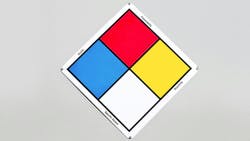Hazard Communication System Citation Prevention — Part 2
The hazard communication system (HCS) regulations are covered in 29CFR1910.1200. Subsection (b) addresses the scope and applications. There’s actually quite a bit of material here. It runs from (b)(1) through (b)(6), and the detail in some of those is such that we get an enumeration of (i) through (xii) in (b)(6). Let’s see if we can distill that down a bit.
(b)(1) requires chemical manufacturers or importers to classify the hazards of the chemicals they sell. “Employers who do not produce or import chemicals” are excluded from this requirement and can focus on the requirements relevant to users. Not all maintenance departments will qualify for the exclusion, because their location may be producing or importing chemicals.
(b)(2) says the HCS rules apply to any chemical known to be present in the workplace.
(b)(3) applies only to laboratories.
(b)(4) provides rules that apply where employees handle only sealed containers that aren’t opened under normal conditions. For example, retail display.
(b)(5) lists seven kinds of chemicals that don’t require labeling. They are things like pesticides and distilled spirits.
(b)(6) lists twelve kinds of substance that the HCS does not apply to. These include tobacco products and food.
Although the exceptions seem to be many, none of them are industrial in nature, and none of them are paints or solvents (in the industrial sense of those words). Everything else falls under the auspices of the HCS.
So, to boil it down: If you are an employer and there are industrial-type chemicals such as paints and solvents in your employees’ workspaces, you must comply with the HCS requirements. These aren’t particularly onerous, but they are particularly useful in protecting the health and safety of your employees.
About the Author

Mark Lamendola
Mark is an expert in maintenance management, having racked up an impressive track record during his time working in the field. He also has extensive knowledge of, and practical expertise with, the National Electrical Code (NEC). Through his consulting business, he provides articles and training materials on electrical topics, specializing in making difficult subjects easy to understand and focusing on the practical aspects of electrical work.
Prior to starting his own business, Mark served as the Technical Editor on EC&M for six years, worked three years in nuclear maintenance, six years as a contract project engineer/project manager, three years as a systems engineer, and three years in plant maintenance management.
Mark earned an AAS degree from Rock Valley College, a BSEET from Columbia Pacific University, and an MBA from Lake Erie College. He’s also completed several related certifications over the years and even was formerly licensed as a Master Electrician. He is a Senior Member of the IEEE and past Chairman of the Kansas City Chapters of both the IEEE and the IEEE Computer Society. Mark also served as the program director for, a board member of, and webmaster of, the Midwest Chapter of the 7x24 Exchange. He has also held memberships with the following organizations: NETA, NFPA, International Association of Webmasters, and Institute of Certified Professional Managers.
